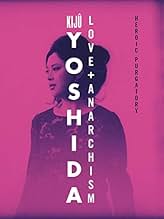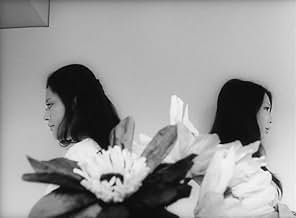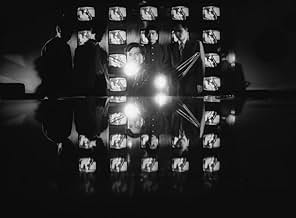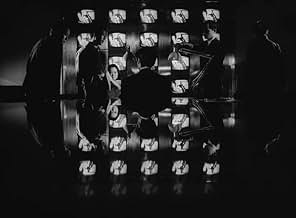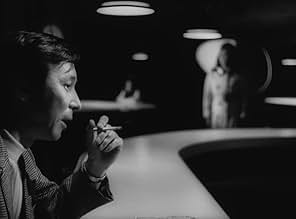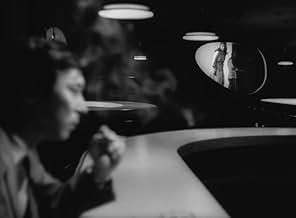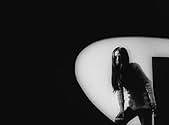Füge eine Handlung in deiner Sprache hinzuAn engineer's wife returns home with a lost teenager. A man posing as her dad tries to get her back, causing the engineer to recall his youth as a revolutionary, obscured by dreamlike disrup... Alles lesenAn engineer's wife returns home with a lost teenager. A man posing as her dad tries to get her back, causing the engineer to recall his youth as a revolutionary, obscured by dreamlike disruptions of time and space, fantasy and reality.An engineer's wife returns home with a lost teenager. A man posing as her dad tries to get her back, causing the engineer to recall his youth as a revolutionary, obscured by dreamlike disruptions of time and space, fantasy and reality.
Empfohlene Bewertungen
This is a movie that was made in the late '60s, early '70s period of Japan when Japan influenced by the Hippie culture was experimenting with their own brand of Avant Garde culture that was sometimes called "Angura". This is shortened Japanese pronunciation for "Underground". As the word suggests, these were experimental non-mainstream production that explored much about free sex, and anti establishment view of the world. Rengoku Eroica was made during the period of such social movement. The director of this movie, Yoshishige Yoshida (Sometimes pronounced Kijyu Yoshida) always had Avant Garde taste to his movies. He was one of the directors that were part of movement called Nuberu bagu ( from the French nouvelle vague) or Japanese New Wave. This can be seen in movie such as Amai Yoru No Hate (1961) starring Masahiko Tsugawa. So this movie was a perfect match for the director. The movie also stars his wife Mariko Okada as the mother of the young rebellious daughter.
The core story of this movie is bit like cheap science fiction. There's would be rocket scientist, guerrillas trying to kidnap an ambassador, wife, daughter that plays disjointed story segments that takes sudden detours in topics that keeps things away from from reality.
It was escapism that had intellectual pride at its core. Youth then were running away from responsibility, but were justifying it in many philosophical smoke and mirror. If you watch this movie, you can see this clearly, as you can't pin down who's responsible for what, and everything is just a play without any reality.
This type of movie rapidly lost favor with the public after the late '60s, and Yoshida himself had to move away from making movies to making TV documentaries. What a drastic swing from non-reality to pure reality. Other directors who were part of Japanese New Wave such as Nagisa Ooshima had to go to France to continue his movie making.
Experimental, and artsy, but the movie has no substance. It's interesting to watch, but don't expect to get anything deep from this movie.
The core story of this movie is bit like cheap science fiction. There's would be rocket scientist, guerrillas trying to kidnap an ambassador, wife, daughter that plays disjointed story segments that takes sudden detours in topics that keeps things away from from reality.
It was escapism that had intellectual pride at its core. Youth then were running away from responsibility, but were justifying it in many philosophical smoke and mirror. If you watch this movie, you can see this clearly, as you can't pin down who's responsible for what, and everything is just a play without any reality.
This type of movie rapidly lost favor with the public after the late '60s, and Yoshida himself had to move away from making movies to making TV documentaries. What a drastic swing from non-reality to pure reality. Other directors who were part of Japanese New Wave such as Nagisa Ooshima had to go to France to continue his movie making.
Experimental, and artsy, but the movie has no substance. It's interesting to watch, but don't expect to get anything deep from this movie.
From the very first frame, you know you are in for something different. The first thing that strikes you is the composition of the visuals. Each frame is an avant-garde work of art. If you turned off the sound and simply watched the visuals it would be worth the time.
The plot is complex and enigmatic. Intentionally ambiguous, it deals with love, truth, reality and the validity of political action. Although it is enigmatic, it is not boring. Instead it stimulates thought on these subject. The ambiguity of the plot means that there are no easy answers and viewers must make up their own minds on these weighty subjects. It also means that the film can be viewed several times.
This is an "art film". The director was a major figure in the Japanese new wave that started in the 60's and watching this film one is reminded of Alain Resnais, although this is not a copy of his style. The film is part of a trilogy of "sex and politics" films (Eros plus massacre; Heroic Purgatory ; Coup D'Etat).
You will not like this if you are looking for an entertaining film, or a film with action, sex, comedy, great one liners and all those other things that can make a film entertaining. There is nothing wrong with such films but this one one of them. It is a film that will make you think.
Finding a good copy of this or any of this director's other films can be difficult. This particular film can be found if you search the internet but it is usually found with very poor and incomprehensible subtitles. Recently someone has made a new subtitle translation but it is very hard to find. I wouldn't recommend the film without this new translation unless you are a Japanese speaker. Subtitles that begin "This morning I lift the floor There are 3 worms" should be avoided. Those that begin "This morning, there were three cockroaches," are good. But on the other hand just watching the visuals can be worth it.
The plot is complex and enigmatic. Intentionally ambiguous, it deals with love, truth, reality and the validity of political action. Although it is enigmatic, it is not boring. Instead it stimulates thought on these subject. The ambiguity of the plot means that there are no easy answers and viewers must make up their own minds on these weighty subjects. It also means that the film can be viewed several times.
This is an "art film". The director was a major figure in the Japanese new wave that started in the 60's and watching this film one is reminded of Alain Resnais, although this is not a copy of his style. The film is part of a trilogy of "sex and politics" films (Eros plus massacre; Heroic Purgatory ; Coup D'Etat).
You will not like this if you are looking for an entertaining film, or a film with action, sex, comedy, great one liners and all those other things that can make a film entertaining. There is nothing wrong with such films but this one one of them. It is a film that will make you think.
Finding a good copy of this or any of this director's other films can be difficult. This particular film can be found if you search the internet but it is usually found with very poor and incomprehensible subtitles. Recently someone has made a new subtitle translation but it is very hard to find. I wouldn't recommend the film without this new translation unless you are a Japanese speaker. Subtitles that begin "This morning I lift the floor There are 3 worms" should be avoided. Those that begin "This morning, there were three cockroaches," are good. But on the other hand just watching the visuals can be worth it.
Yoshida's films are luminous, ethereal creations, languid love affairs blown into abstract shape by memory and time. In the period when he studied/essayed the great Antonioni, he gave us films of simple, perhaps ponderous beauty. But with Eros+Massacre he finally unraveled. This is a companion piece to that labyrinth.
I can't imagine what it must've been to see this back in 1970 with fresh eyes, what possibilities of cinema it may have opened. Thirty years later I can see that some of the things Yoshida foresaw panned out, others didn't. But this film is a maddening enigma that stands the test of that time passed, meaning it's not simply a cultural artifact of New Wave and the time when the revolutionary spirit was believed to be a force of change, but an entire evolutionary phase of cinema, New Wave before and after.
If the movie works then as more than bold experiment, it's because these particular ephemeral struggles are abstracted, the lifetime they in turn inspire and disappoint is fragmented, past and future spinning out of original frameworks. What we get from this rearrangement is a snapshot of human beings caught into disparate planes of existence, wishing to see or connect or recognize meaning in what they do.
In a brilliant scene that takes place in the 80's, one of many flash forwards into future or imaginary time, the cast of characters is assembled in an open space to hold court. Unable to properly remember a key event, they turn to a figure perched in a high chair holding a film camera to arbitrate. This surrogate filmmaker allows them back in time.
We see how the two lovers met, we see where that love brought them. We get here a beautiful realization, that the man's greatest aspiration, who is a famous scientist, is to be a good husband to his wife. The camera looks back at Mariko Okada, standing a little back from her husband being interviewed, and we see her gracefully, stoically looking out a window. Yoshida's gentle tribute to the love of his life, his wife in real life.
We see an entire life, shared by these two people, be trapped in moral dilemmas and modern anxieties, thought to be important at the time, lifechanging, with hindsight though nothing but trivial. We see them struggle to remember or forget. Yoshida gives us here a bitter last goodbye to the spirit of '68, showing us how the romance with the social struggle grew sour. These ideas having led nowhere, our only chance for happiness is with our other half that completes us. The one romance that matters.
The film is the final moments of consciousness, memory looking back upon itself.
I can't imagine what it must've been to see this back in 1970 with fresh eyes, what possibilities of cinema it may have opened. Thirty years later I can see that some of the things Yoshida foresaw panned out, others didn't. But this film is a maddening enigma that stands the test of that time passed, meaning it's not simply a cultural artifact of New Wave and the time when the revolutionary spirit was believed to be a force of change, but an entire evolutionary phase of cinema, New Wave before and after.
If the movie works then as more than bold experiment, it's because these particular ephemeral struggles are abstracted, the lifetime they in turn inspire and disappoint is fragmented, past and future spinning out of original frameworks. What we get from this rearrangement is a snapshot of human beings caught into disparate planes of existence, wishing to see or connect or recognize meaning in what they do.
In a brilliant scene that takes place in the 80's, one of many flash forwards into future or imaginary time, the cast of characters is assembled in an open space to hold court. Unable to properly remember a key event, they turn to a figure perched in a high chair holding a film camera to arbitrate. This surrogate filmmaker allows them back in time.
We see how the two lovers met, we see where that love brought them. We get here a beautiful realization, that the man's greatest aspiration, who is a famous scientist, is to be a good husband to his wife. The camera looks back at Mariko Okada, standing a little back from her husband being interviewed, and we see her gracefully, stoically looking out a window. Yoshida's gentle tribute to the love of his life, his wife in real life.
We see an entire life, shared by these two people, be trapped in moral dilemmas and modern anxieties, thought to be important at the time, lifechanging, with hindsight though nothing but trivial. We see them struggle to remember or forget. Yoshida gives us here a bitter last goodbye to the spirit of '68, showing us how the romance with the social struggle grew sour. These ideas having led nowhere, our only chance for happiness is with our other half that completes us. The one romance that matters.
The film is the final moments of consciousness, memory looking back upon itself.
Pure geometric chaos in Yoshida Yoshishige's "Heroic Purgatory", which is also the second film in his Trilogy of Japanese Radicalism, produced under the aegis of Japan's legendary Art Theater Guild. This is probably my fav film of his, especially in terms of visuals. Watching it feels like falling into a trance, I keep chasing the high of watching Heroic Purgatory, but no other Yoshida movie has come close.
Yoshida's strength is without a doubt his image composition, the way he frames his shots is so meticulously done. The story centers around an engineer and his wife (played by the great Hiroshi Inagaki regular Mariko Okada, who is also Yoshida's spouse and long term collaborator) who find a lost teenager leading the engineer to recall his younger days as a political radical. As this narrative plays out, Nanako's husband tells the story of his past when they met in a time when he was involved in reformist politics. Underneath, this film explores the past, present and future of the early 1970's political radicalism in a volatile Japan. As the film progresses, the temporal space is crushed mixing past, present, and future together. Abandoning linear storytelling for an ethereal trip into a labyrinth of memories, fears and delusions Yoshida gives viewers a stylistic feast injected into a revolutionary thriller. Cinematographer Motokichi Hasegawa and editor Hiroyuki Yasuoka, presents a visual language that recalls other great films (appropriate given Yoshida's background as a film critic...he also wrote a book on the films of Yasujiro Ozu) while continually exploring new ground; there's so many compositions, so many scenes that defy the conventional expectations of filmmaking...it's absolutely intoxicating to behold. Toshi Ichiyanagi's score is also a tremendous win, giving an atmospheric almost science fiction-like vibe to accentuate the stunning visuals.
Yoshida's strength is without a doubt his image composition, the way he frames his shots is so meticulously done. The story centers around an engineer and his wife (played by the great Hiroshi Inagaki regular Mariko Okada, who is also Yoshida's spouse and long term collaborator) who find a lost teenager leading the engineer to recall his younger days as a political radical. As this narrative plays out, Nanako's husband tells the story of his past when they met in a time when he was involved in reformist politics. Underneath, this film explores the past, present and future of the early 1970's political radicalism in a volatile Japan. As the film progresses, the temporal space is crushed mixing past, present, and future together. Abandoning linear storytelling for an ethereal trip into a labyrinth of memories, fears and delusions Yoshida gives viewers a stylistic feast injected into a revolutionary thriller. Cinematographer Motokichi Hasegawa and editor Hiroyuki Yasuoka, presents a visual language that recalls other great films (appropriate given Yoshida's background as a film critic...he also wrote a book on the films of Yasujiro Ozu) while continually exploring new ground; there's so many compositions, so many scenes that defy the conventional expectations of filmmaking...it's absolutely intoxicating to behold. Toshi Ichiyanagi's score is also a tremendous win, giving an atmospheric almost science fiction-like vibe to accentuate the stunning visuals.
I felt much the same way about this one as I felt about the previous, more famous Yoshida film I watched last week, Eros + Massacre: it's gorgeous but maddeningly esoteric. As a result of its difficulty, I found the film fairly boring. This one is perhaps even more difficult than Eros + Massacre, but it's also 90 minutes shorter, so I'd rate them pretty much even. The film involves Communist revolutionaries in Japan, who were more or less outlawed in the country by the U.S. The film spans several time periods, including the distant future of 1980 (you can tell it's the future because of the theremin music). The main action begins in 1952, which was a turbulent year for student protests. One might just watch it for the visuals - what Yoshida does with space is absolutely astounding at times. The filmmaking often brings to mind Antononi and Resnais. But it's hard to watch it just for the visuals when you know Yoshida is trying to get at something and is so deadly serious about it.
Wusstest du schon
- WissenswertesThe second movie in Yoshishige Yoshida's unofficial trilogy on Japanese radicalism. The other two titles are Eros und Massaker (1969) and Kaigenrei (1973).
Top-Auswahl
Melde dich zum Bewerten an und greife auf die Watchlist für personalisierte Empfehlungen zu.
- How long is Heroic Purgatory?Powered by Alexa
Details
- Laufzeit1 Stunde 58 Minuten
- Farbe
- Sound-Mix
- Seitenverhältnis
- 1.33 : 1
Zu dieser Seite beitragen
Bearbeitung vorschlagen oder fehlenden Inhalt hinzufügen


